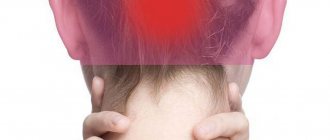Headaches that occur when coughing are classified as atypical because they are quite rare. Basically, such pains are benign and short-lived, with rapid onset and immediate extinction. They appear as a result of a strong cough, which provokes an increase in venous pressure, and their symptoms are similar to headaches of physical tension. The pain is most often bilateral, intense, knocking or stabbing.
The duration of the attack, as a rule, does not exceed several minutes (in some cases - up to 30 minutes), so this type of headache is most often of a primary nature and, as a rule, harmless. However, in some cases, the occurrence of such pain in the head may indicate a serious illness (including an intracranial space-occupying formation). Some people experience a dull headache after an attack, which can last up to 2 hours.
Features of headache when coughing
Headaches that accompany a severe cough are often primary, that is, not associated with pathologies of internal organs. They occur directly during a coughing attack or during a period of illness, but disappear after feeling better. They have several features:
- intense, sharp, spreading over the entire surface of the head;
- may have a pulsating character;
- last no more than 2-3 minutes, rarely up to half an hour;
- are not accompanied by additional symptoms (nausea, increased sensitivity to light, etc.).
During a cold or flu, cough of allergic origin, chronic diseases can worsen. So, these diseases can trigger a migraine attack.
When urgent medical attention is required
A severe headache with a cold can be a symptom not only of ARVI or uncomplicated influenza, but also of more dangerous diseases, such as meningitis. If the discomfort does not go away for a long time, increases with tilting the head and sudden movements, or is accompanied by nausea and vomiting, you should immediately consult a doctor.
There are other types of pain that may indicate the development of serious diseases. You should not delay visiting a specialist, especially in the following cases:
- a painful attack due to a cold or viral disease becomes intense and unbearable;
- painful sensations are combined with a pre-fainting or fainting state, muscle weakness;
- body temperature rises above 38 ° C, muscle spasms occur, which are localized mainly in the neck, photophobia develops - these symptoms may indicate the development of meningitis.
Causes of headaches when coughing
The main reason why headaches occur with respiratory diseases is an increase in blood pressure during coughing. This symptom occurs for a short time as the pressure normalizes between attacks. Another reason is the deterioration of oxygen supply to the brain. This is caused by respiratory failure, swelling of the walls of the respiratory tract. The patient feels weakness, dizziness, deterioration of health and prolonged headaches.
With different types of cough, pain in the head may differ in origin, symptoms and characteristics:
- Colds and flu are common diseases with clear symptoms. They are accompanied by cough, fever, weakness, redness and sore throat. Headaches can be triggered by general intoxication, as well as deterioration of blood supply to the brain.
- Chronic hypertension (main article: Headache with hypertension) is a disease that can worsen during coughing. An increase in blood pressure leads to intense, throbbing pain in the head, deterioration of hearing and vision, and dizziness. The attack can be relieved by using medications to lower blood pressure; it is also important to ensure that the patient rests and has sufficient oxygen access.
- Allergic cough - caused by swelling of the mucous membranes of the respiratory tract in response to an allergen. This leads to the development of respiratory failure and a sharp decrease in oxygen access to the brain. It is important to monitor your health and immediately take an antihistamine - laryngeal edema is life-threatening for the patient.
- Bronchial asthma is a chronic autoimmune disease in which the patient experiences swelling of the walls of the bronchi and lungs. The disease occurs with alternating attacks of exacerbation and remission. The cough is accompanied by dizziness, a sharp deterioration in health, and pressing headaches.
A cough that is accompanied by headaches may be the result of bad habits, especially smoking. It can also be triggered by polluted air, frequent exposure of chemical reagents and bullets to the respiratory tract - these factors cause irritation of the mucous membrane.
How is the diagnosis carried out?
The danger of problems with blood vessels cannot be underestimated. A severe headache when coughing occurs due to a sharp spasm and increased intracranial pressure. This condition can cause a stroke. Therefore, if an unpleasant symptom appears, you should immediately seek help from a specialist.
What the doctor will ask:
- localization (headache radiates to the temples, forehead or back of the head);
- the presence of secondary symptoms (runny nose, loss of coordination, fever, body aches, dry mouth, nausea);
- the influence of negative external factors (bad habits, physical overload, previous skull injuries).
This information is important for making a correct diagnosis and prescribing adequate treatment. For example, when pain is located in the back of the head, one can assume hypertension, discomfort accompanied by snot. The discharge of sputum indicates the presence of acute respiratory viral infections, acute respiratory infections, and periodic dizziness should be a reason to check the state of the nervous system.
If, during a visual examination and history taking, the reasons for the deterioration in the condition were not identified, the doctor recommends undergoing a hardware examination. The sources of frightening symptoms can be determined after ultrasound, magnetic resonance, computed tomography (MRI, CT), and blood pressure measurements.
Diagnostic methods
If a cough occurs simultaneously with headaches, it is important to understand its origin. To do this, the doctor will prescribe a set of examinations that will show the full picture of the disease. These may include:
- clinical and biochemical blood tests;
- Dopplerography of the vessels of the neck and brain - ultrasound using a contrast agent;
- blood flow velocity analysis;
- test for allergic and autoimmune diseases;
- MRI of the head – to exclude cysts, neoplasms, aneurysms and other dangerous pathologies.
The Clinical Institute of the Brain has all the conditions for quick and high-quality diagnosis of diseases that are accompanied by cough and headache. There is modern, highly sensitive equipment here - its use guarantees the most accurate result.
Influence of external factors
In most cases, a headache when coughing becomes a consequence of a sharp deterioration in health due to infection of the body with viruses, fungi or bacteria. ARVI and acute respiratory infections often cause unmotivated fatigue, drowsiness, runny nose, and increased body temperature. Signs of sore throat and flu also include a sharp increase in pressure in the blood vessels, which leads to spasms.
Before visiting a doctor, you need to make sure that the discomfort is not caused by negative external factors. Pain in the back of the head, temples, and frontal part is often the result of inhaling toxic fumes, smoke (smoking), physical stress or injury. Cough can be an accompanying symptom, for example, if the patient is susceptible to allergic reactions.
- Why does it hurt behind the knee when bending and straightening - what to do and how to treat this pain
Treatment of headaches and cough
Treatment is aimed at eliminating the main symptoms of the disease and additional signs. Methods are selected individually, depending on the exact diagnosis and individual characteristics. So, the doctor may prescribe the following treatment methods:
- antibiotic therapy – effective for bacterial diseases of the respiratory tract;
- antiviral agents, vitamins and restoratives for colds;
- specific treatment for allergic and autoimmune diseases;
- a set of techniques to lower blood pressure.
Treatment at the Clinical Brain Institute is an individual scheme, which is selected based on diagnostic results. Our center has all the conditions for inpatient and outpatient treatment. The process takes place under the supervision of experienced doctors - specialists of a wide and narrow profile.
Why might my right side hurt?
The causes of this symptom are usually associated with internal organs. “This is a sign that something located on the right side of the abdomen is suffering,” says Bulat Yunusov, a surgeon at GMS Clinics and Hospitals. “The cause of damage to these organs can also be different, for example, inflammation, oncological processes, trauma, consequences of previous operations, neurological disorders.”
However, this symptom may have other reasons. “An unpleasant sensation in the right side can be muscular in nature, especially if it occurs after physical activity. If a person falls on their right side, the pain may be associated with muscle contusion or injury, such as myositis. Gallstones can also cause an uncomfortable tingling sensation in your side. The stones close the ducts, which leads to swelling of the bladder and, as a consequence, to the occurrence of calculous cholecystitis, that is, an inflammatory process. All this, of course, is accompanied by pain,” commented an invited specialist from another medical center. Let's look at the main causes of pain in the right side.
Prevention methods
To prevent colds, acute respiratory viral infections and flu, it is important to follow general recommendations to strengthen the immune system. It is useful to spend a lot of time outdoors, engage in moderate physical activity, and take vitamins during the cold season. Doctors also recommend monitoring blood pressure levels.
The Clinical Brain Institute specializes in the diagnosis and treatment of diseases that are accompanied by headaches. Experienced doctors will select a medication regimen to reduce cough, relieve headaches and other symptoms. It is important to follow all recommendations at home, not skip medications and follow additional prescriptions.
Clinical Brain Institute Rating: 5/5 — 1 votes
Share article on social networks
How to alleviate the patient's condition
It is important to understand that a headache when coughing, radiating to the back of the head, temples, and forehead, is a symptom of a dangerous condition. Self-medication is strictly prohibited. The wrong choice of therapeutic actions often leads to catastrophic consequences (heart attack, stroke, acute allergic reaction).
Classic treatment for headaches aggravated by coughing
Most often, doctors recommend starting with eliminating the general symptoms of the pathological condition. It is necessary to reduce body temperature, cure a runny nose, and an inflammatory process. Such actions will ensure normal blood flow in the brain and improve gas exchange.
Medications recommended for headache relief:
- Nurofen helps remove swelling, reduce fever, and has an analgesic effect;
- Ibuprofen acts on peripheral vessels, reducing the frequency of spasms;
- "Paracetamol" - the mechanism of action is associated with inhibition of prostaglandin synthesis.
Tablets such as “Analgin” and “Spazmalgon” can be placed in a separate group. These drugs have a vasodilating effect, quickly eliminate headaches, and soften dry, hysterical cough. The main thing is to understand that these medications have a long list of side effects, so you can only take them after your doctor’s approval.
Application of compresses
You can get rid of coughing headaches with the help of safe treatment with pharmaceutical drugs. To relieve symptoms, apply compresses that can be made at home. The most common recipes are those using vinegar (it needs to be diluted in cool water), boiled potatoes and vodka. Doctors advise trying to dilate blood vessels by lowering body temperature. To do this, you need to apply ice wrapped in a regular towel to your forehead and back of your head.
- Why does pain occur in the front of the shin?








